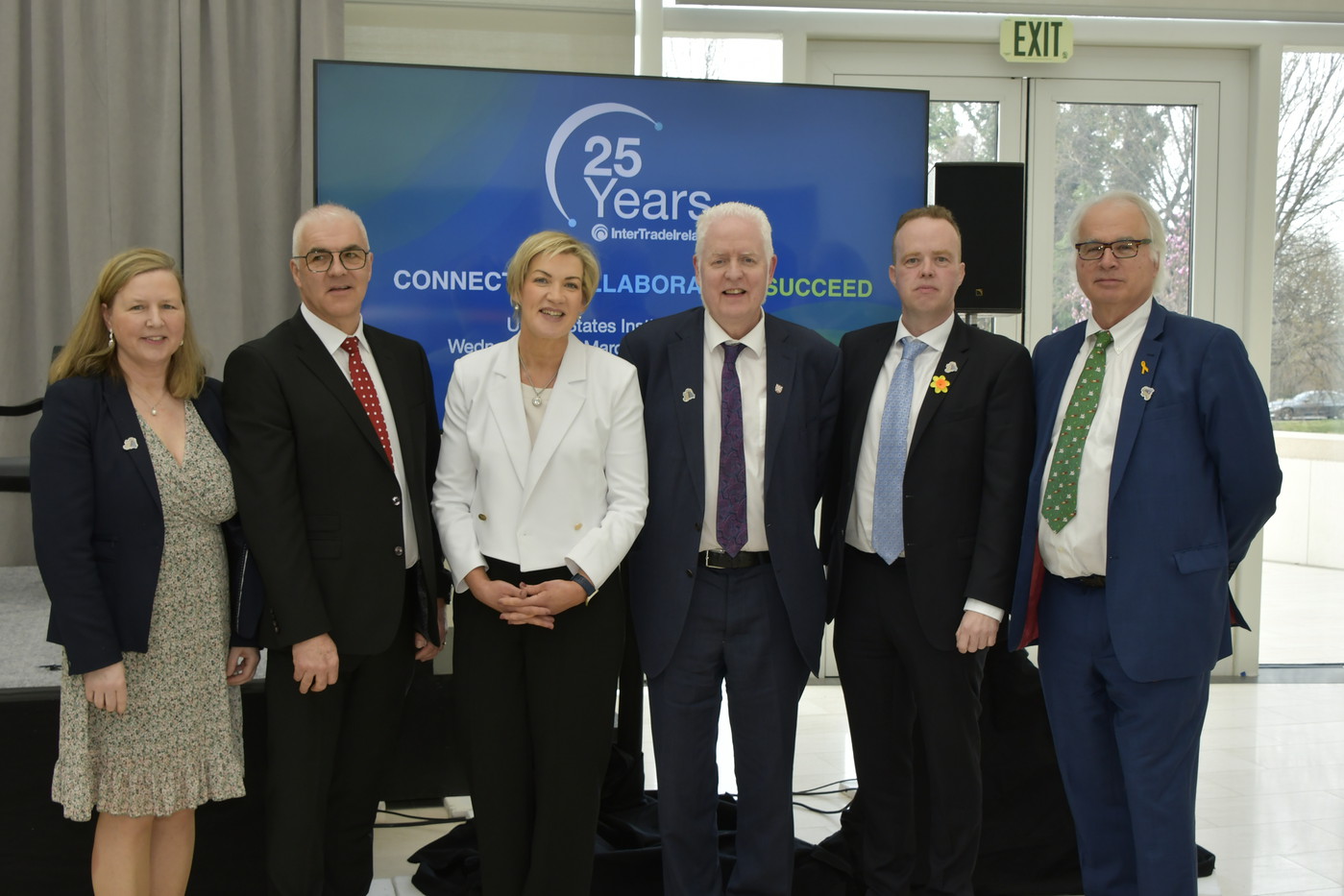Queen’s University Belfast Transatlantic Partnership Celebrates 25 Years of Cancer Research and Care on the Island of Ireland
The Ireland – Northern Ireland – U.S. National Cancer Institute (NCI) Cancer Consortium celebrates its 25th Anniversary this year.
The Consortium is a unique partnership, established in 1999, between the governments of Ireland, Northern Ireland, and the United States, as a direct result of the Good Friday Agreement.
The Consortium has acted as a catalyst, enhancing cancer research quantity and quality both between researchers in Northern Ireland and Ireland and with premier institutions in the U.S., leading to improved cancer outcomes on the island of Ireland.

Above: Dr Rosemarie Gannon, Project Manager at All Island Cancer Research Institute (AICRI); Richard Kennedy Chair of InterTradeIreland; Margaret Hearty CEO of InterTradeIreland; Professor Mark Lawler, Professor of Digital Health at Queen’s University Belfast and Co-Lead of AICRI; Professor William Gallagher, Professor of Cancer Biology at University College Dublin and Co-lead of AICRI; Dr Stephen Chanock. Chief Division of Cancer Epidemiology and Genetics at the National Cancer Institute, USA.
U.S. National Cancer Institute Director, Dr W. Kimryn Rathmell, noted that: “Collaboration between nations can be a powerful stimulus for advancing cancer research. This is an exciting milestone anniversary for a partnership that has been so successful and beneficial for Ireland, Northern Ireland, and the United States.”
Speaking at the InterTradeIreland 25th Anniversary event at the United States Institute of Peace in Washington DC, Professor Mark Lawler, Professor of Digital Health at Queen’s University Belfast, and Co-lead of the All-Island Cancer Research Institute (AICRI), said: “The work of the Consortium highlights the significant cancer legacy that the peace process and the Good Friday Agreement have delivered for people from all parts of this island.
“This unique partnership has been truly transformative, with 35,000 patients on the island of Ireland participating in clinical trials, saving thousands of lives; a 15% improvement in cancer survival and a 550% increase in cancer quality underpinning significant research and innovation that will have both health and economic impact for this island. Cancer knows no borders – neither should we.”
Dr Stephen Chanock, Chief of the Division of Cancer Epidemiology and Genetics at the US National Cancer Institute who also spoke at the event, said: “I remember being with Professor Lawler in Stormont in 1999 when the Memorandum of Understanding was signed which established the Cancer Consortium. The partnerships that we have grown together over the last 25 years have delivered excellent science and also led to innovative training programmes.
“One initiative that I’m particularly proud of is the Queen’s University Belfast – US NCI Doctoral Training Programme in Precision Cancer Medicine. Professor Lawler and I co-created this programme which is being led by Doctor Nick Orr, Reader in Cancer Genomics at Queen’s and who worked with me at NCI, with 7 PhD students from the island of Ireland studying at the NCI with joint supervision by Queen’s and NCI mentors.”
Cancer research student, Alice Browne, commented: “This has been an exciting, once in a lifetime, opportunity to work in one of the most prestigious cancer research institutes in the world, learn the latest techniques, and apply them to deliver high quality science that will be translated into a clinical trial that we hope will benefit cancer patients.”
Professor Lawler presented the Consortium’s activities at the Science Summit of the UN General Assembly in New York last September, where it was highlighted as a global exemplar of the health dividend of peace.
Dr Satish Gopal, Director of the Centre for Global Health at the NCI said: “We are delighted to have been a partner in this work over the last 25 years. This research we have done together exemplifies how by collaborating across borders, we can achieve transformative change. Cancer is a global challenge and initiatives such as this point the way forward.”
Professor William Gallagher, Professor of Cancer Biology at University College Dublin and Co-Lead of AICRI said: “I am delighted to have participated in this event and highlighted how the work of the last 25 years is acting as a springboard for the All-Island Cancer Research Institute (AICRI).
“This unique collaboration of 10 universities across the island of Ireland, along with other key stakeholders, is dedicated to delivering high-quality cancer research and innovation. Through our work, we will gain a better understanding of cancer, develop more personalised treatments, ease suffering and save lives.”
Margaret Hearty, CEO of InterTradeIreland who hosted the event said: “We were keen to showcase the progress of the Cancer Consortium at our 25th anniversary event today, it’s a great example of how real progress often requires collaboration. InterTradeIreland’s Synergy programme is working with Professors Lawler and Gallagher through the All-Island Cancer Research Institute to map precision oncology across the island, as a first step towards developing an all-island oncology innovation cluster. InterTradeIreland’s work is testament to the fact that collaboration is a vital foundation for the construction of a better future.”
Professor Lawler added: “While we have achieved a lot in the last 25 years, there is much work still to be done, particularly with the disastrous impact that the COVID pandemic and national lockdowns have had on cancer patients and cancer services.
“Given the recent return of the Stormont Assembly, we have an unrivalled opportunity to work together on an all-island basis for cancer patients. We need to be bold; we need to be ambitious and, most of all, we need to cooperate to address one of the greatest challenges in human health. We need to compete, not against each other, but against our common enemy – cancer.”
Professor Lawler, Dr Chanock and Professor Gallagher spoke at the InterTradeIreland 25th Anniversary event at the United States Institute of Peace in Washington DC on Wednesday 13th March.

